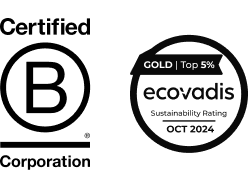Welcome to the work café – a modern 'third place' that brings people together and strengthens your company culture. The key to making it work? Furnish it with purpose.
Why the ‘coffice’ doesn't always workIn a move that sparked headlines and social media buzz around the world, Starbucks in South Korea recently asked patrons to stop bringing in “bulky items” like desktop computers, and even office-style partition walls to help them finish their business tasks.
You can't take a printer to Pret-a-Manger
This story underlined how ‘the coffice’ still operates as an important third space for many workers. Not quite home, not quite office, but a zone where they can think, meet, work or simply feel connected to the wider world.
But surely there’s a better option to access that feeling, other than taking your printer to Pret?
The social buzz that sparks creativity
Many people who regularly WFH find a cafe can give them the social buzz they need to complete a work project. Even hybrid workers who deliberately come into the office can find themselves retreating to the local coffee shop as a ‘third place’ where they can reflect and recharge.

Beyond caffeine, what’s the big attraction?
So, what makes a coffee shop such a good place to work?
Research by the University of Illinois has shown that the hum of a cafe can actively heighten people’s productivity, while the prospect of simply communing with others can release the dopamine that triggers creativity.
And therein lies the true power of ‘the third space’.
The power of the third space
Urban sociologist Ray Oldenburg developed the concept of the ‘third place’, believing that populations of great cities thrived only when they had access to these communal spaces.
Cafés, libraries, pubs and parks – were the “in-between” zones that enabled informal encounters and the cross-pollination of ideas across social boundaries.
Oldenburg argued that without access to these neutral, shared spaces, society risked becoming insular, fragmented and polarised.
And the same holds true of our organisations.
Why third spaces matter more than ever
Hybrid working has brought welcome flexibility, but it has also fragmented culture, reduced informal learning and made collaboration harder to spark organically.
Third spaces like ‘work cafés’ are emerging as powerful antidotes to these challenges.

Many companies have discovered that when designed well, they can become:
-
Cultural touchpoints where values are lived, not just displayed.
-
Social magnets that drive spontaneous interaction and cross-team connection.
-
Learning grounds for mentoring, collaboration and informal knowledge-sharing.
-
Wellbeing boosters that support autonomy, comfort and cognitive reset.
As Steelcase’s Cherie Johnson puts it:
“Creating a highly effective corporate third place involves more than access to good coffee and Wi-Fi. It’s about integrating work and life. It’s about creating an environment that supports the wellbeing of people physically, cognitively and emotionally.”
The rise of the work café
More than ever, organisations need spaces that flex with how people actually work.
And because people naturally gravitate toward comfort and choice (not to mention food), a well-designed work café often becomes the default destination for productivity, collaboration and business culture.
As Ray Oldenburg himself noted in an interview with Steelcase:
“If you get people sitting together, talking together, innovation comes quicker. And I think that’s going to be the thing for business and industry for a long time.”
Is your work café working hard enough?
But simply mimicking the vibe of a local café alone won’t cut it.
Lounge furniture without an ergonomic twist won’t support hours of focused work, and a lack of power access or flexibility can quickly limit its usefulness.

To truly support your people as they seek the social buzz, third spaces must do more than feel good – they need to work hard. Comfort, adaptability, and integrated tools are essential.
At Insightful Environments, we help organisations transform informal zones into high-performance, multi-purpose environments that flex with the business and energise the culture — like our work in Bruntwood’s Sci-tech innovation hub in Leeds.
9 ideas for furnishing your work cafe
1. Booths for eating, working & conversing
A work café should offer a variety of seating – enclosed enough to give privacy, but big enough for people to spread out or meet in small groups.
BLOX Banquette Seating 300 is a reconfigurable solution for dining, collaborative work, and privacy. It features 300mm wide panels, optional planter inserts, and robust frames for tool-free reconfiguration.
With panels available in multiple finishes, it’s easy to update and refresh the look to match your corporate feel.

BLOX banquette seating 300 by Icons of Denmark
2. Working from a standing start
Not everyone wants to sit low. Perching and stand-height cafe seating options can help keep energy levels up. Add furnishing options that can help people plug in and play from a standing start.
Obelos® Collaborative Tables are a highly versatile, customisable collection that empower people to connect, learn, and work in dynamic ways.
These perching tables can come with power points built in.

Obelos® Collaborative Tables by Steelcase
3. Design for rejuvenation
Between meals and meetings, people need spaces to reset. Use lounge furniture, warm lighting, and natural materials in parts of your cafe area to create a calm, restorative experience.
In the past few years some incredibly, hard wearing, stylish and super comfy seating choices like the Jean Nouvel Seating Collection have emerged on the scene.
Built with subtle contours that expertly support arms and backs, the boldly rounded forms of this office lounge seating collection flow like a wave across the seams and swells of each seat to suspend the body softly.

Jean Nouvel Seating Collection from Coalesse
4. Zone for variety
A work café needs to support a full range of activity – from lunch meetings, to client get togethers, quiet solo work and casual chats. But to make this work, you need thoughtful partitioning and acoustic zoning.
The Orangebox Away from the Desk (AftD) collection offers seating units with low, high, or mixed back heights to enable varying configuration of groups and degrees of privacy.

Away from the Desk - Orangebox's solutions for communal areas
- Comprised of 70+ components that can be endlessly configured.
- High back options provide refined acoustic and visual privacy.
- Large and small work surfaces can be specified within the system.
- Integrated power, data and monitors are available for added performance.
- Product range: media tables, detached seating, media dens & open settings.
This enclosed AftD Media Den allows for on-line, working lunches:

5. Choose stackable seating - with a playful twist
Agility is key in an informal space. Lightweight tables, stools, and soft seating should make it easy for teams to rearrange layouts.
The Jelly Stool from Dead Good is upholstered, stackable, and full of personality. Its jelly-inspired curves and playful “wobble” make it a standout choice for informal spaces that move and flex as quickly as your teams do.
6. Unfolding furniture helps your space scale
Need to flip from café mode to collaboration mode in minutes? Foldable furniture makes reconfiguration effortless.
Howe’s Folding Surfaces provide fully functional, power-integrated work surfaces that unfold wherever they’re needed, keeping your work cafe space endleslly adaptable.
7. Enable privacy on demand
Steelcase Flex Kiosk is a practical retreat for the open plan space: an office privacy pod offering visual shelter during informative, spontaneous video calls and brief focus sessions.
If you have to slip away to take a call between sips of your latte, this is the perfect option

8. Bring Power to the people
Integrated charging within lunch tables, booths, and lounge seating keeps people – and their devices – connected and ready to work.
But for a truly cordless experience, think about offering portable powerpacks as standard in your work cafe.

“Our enterprise-grade power packs are lightweight enough to carry around the office and compact enough to sit next to your laptop at a counter, in a booth or as you spread out on a larger table in a work café.”
Richard Ripper, Omnicharge
9. Think inside-out
If you’ve got outdoor spaces, extend your café beyond four walls. Alfresco work cafés bring in daylight, fresh air, and wellbeing benefits. Insightful Environments can access a stunning range of outdoor seating options for you to consider:
%20copy%20(1).gif?width=646&height=531&name=Cabrio-Extremis%20(1)%20copy%20(1).gif)
Extremis Cabrio, a luxury two-seater sofa
Your culture, your café
When we design with intent, workplace third spaces become more than nice-to-haves. They become infrastructure for connection, creativity and culture.
At Insightful Environments, we partner with organisations to turn overlooked cafés and dead spaces into high-impact hubs that, energise teams and support new ways of working.
Because the office café isn’t just where you go for a flat white.
It’s where culture happens.










